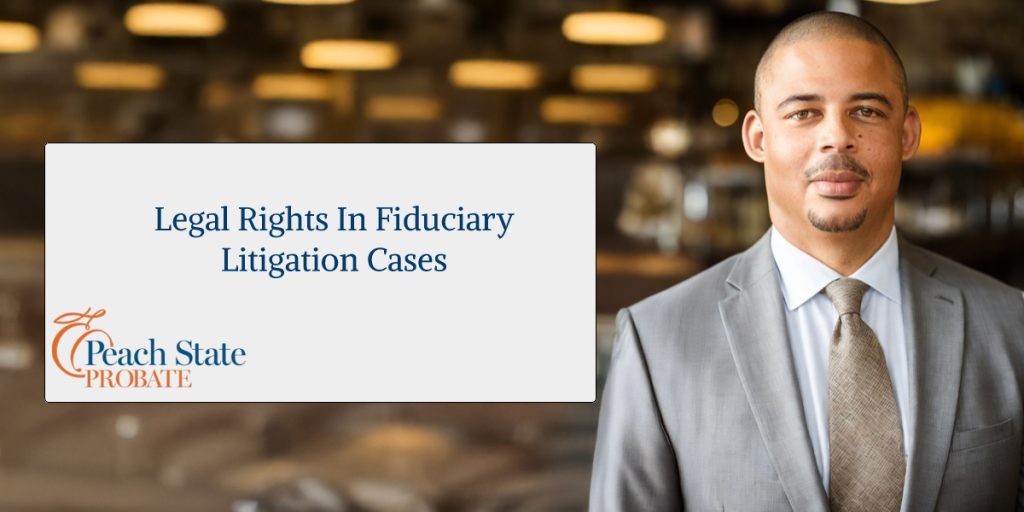## Understanding Fiduciary Litigation and Your Legal Rights
Fiduciary litigation refers to legal disputes that arise when a fiduciary—the person or entity entrusted to manage another party’s assets—fails to fulfill their duties. These duties can include managing financial assets, overseeing estate matters, or handling trusts. When a fiduciary acts inappropriately or fails to act, it can lead to significant financial and emotional repercussions for the parties involved. Therefore, understanding your rights in fiduciary litigation is crucial for anyone who may find themselves needing to navigate this complex area of law.
To appreciate fiduciary litigation fully, one must recognize the roles of those involved. Fiduciaries can be executors, trustees, agents under power of attorney, or other individuals who take on the responsibility of managing another’s affairs. When these individuals breach their duties, either through negligence or misconduct, legal action may be warranted. As a result, the ability to identify and assert your rights can be vital to the recovery of assets and the protection of your interests.
In Georgia, fiduciary obligations are governed by both common law and statutory provisions. For individuals involved in fiduciary litigation, understanding these laws becomes essential. Legal rights can include the right to seek financial restitution, the ability to remove a fiduciary from their role, or pursuing damages for breach of duty. With the right guidance, affected parties can take affirmative steps to protect their financial and legal interests.
## Defining Fiduciary Litigation
Fiduciary litigation arises in various contexts such as disputes among beneficiaries of a trust, challenges to the actions of a trustee or executor, or claims against attorneys for failing to act in the best interests of their clients. Understanding the specific nature of fiduciary litigation is crucial for anyone involved in such disputes. These cases often hinge on the breach of fiduciary duty, which encompasses a range of obligations, including loyalty, care, and good faith.
At its core, fiduciary litigation examines whether a fiduciary has acted in accordance with their legal and ethical responsibilities. If evidence shows that a fiduciary has failed to act appropriately—whether through self-dealing, mismanagement of funds, or gross negligence—the affected party may have grounds for legal action. A fiduciary’s failure can result in financial loss, which may warrant compensation through litigation.
The implications of fiduciary litigation can extend far beyond monetary damages. Not only does a fiduciary breach potentially lead to personal financial consequences, but it can also impact trusts, estates, and family dynamics. Thus, understanding the legal landscape of fiduciary litigation allows individuals to better navigate their rights while safeguarding their interests.
## Importance of Fiduciary Litigation
Fiduciary litigation serves as an essential mechanism for upholding the legal and ethical standards imposed on fiduciaries. The role of a fiduciary is one of great trust; hence, the consequences of mismanagement or misconduct can be profound. Parties involved in fiduciary relationships rely heavily on the assurance that their interests will be protected. When that trust is violated, the legal framework providing for fiduciary litigation becomes critical.
In many cases, fiduciary litigation is not just about financial restitution; it also addresses the broader social implications of trust and accountability. By holding fiduciaries accountable for their actions, the legal system reinforces the principles of duty and care that underlie fiduciary relationships. This can foster a sense of security among clients and beneficiaries, knowing there are avenues to seek justice in cases of wrongdoing.
Moreover, fiduciary litigation often serves to clarify legal rights and boundaries. When cases are contested in court, they can set precedents that further define fiduciary responsibilities and inform future conduct. This not only benefits the immediate parties involved but also enhances the overall integrity of estate and trust administration by discouraging future breaches of duty.
## Legal Framework Surrounding Fiduciary Litigation
The legal framework governing fiduciary litigation is complex and often varies by jurisdiction. In Georgia, fiduciary duties are primarily derived from statutory law, including the Georgia Trust Act and the Probate Code. These laws define the responsibilities of fiduciaries and the legal avenues available for parties who feel those duties have been breached.
An essential aspect of the legal framework involves understanding the specific duties owed by fiduciaries. These can include duties of loyalty, disclosure, and care, which obligate fiduciaries to act in the best interests of the beneficiaries or principals. When a fiduciary fails to meet these obligations, they may be held liable for any resulting damages. The courts often look to precedent cases to discern appropriate standards of care and legal interpretations surrounding fiduciary duties.
Understanding the legal framework is crucial for identifying potential claims in fiduciary litigation. Whether it’s mismanagement of investments, failure to distribute assets, or self-dealing, these claims must be anchored in a clear understanding of established laws. Knowledge of both statutory regulations and case law aids claimants in effectively navigating the fiduciary litigation process, ensuring that their rights are adequately asserted and protected.
## Real-World Scenarios in Fiduciary Litigation
Examining real-world scenarios of fiduciary litigation provides insight into the complexities and challenges involved in these cases. One common instance occurs when a trustee mismanages trust assets, leading to significant financial losses for beneficiaries. In such cases, beneficiaries may choose to file a lawsuit against the trustee, claiming a breach of duty. Demonstrating the extent of mismanagement and its impacts becomes central to these disputes.
Another significant example can be found in estate administration, particularly when heirs contest the actions of an executor. Disputes often arise concerning the distribution of assets, valuation issues, or claims of undue influence over the decedent’s decisions. In these situations, heirs may seek to remove the executor or challenge the validity of the estate plan itself in court. The resolution of these disputes may involve extensive litigation, highlighting the emotional and financial stakes involved.
Additionally, fiduciary litigation can arise from breaches by financial advisors. For instance, if an advisor fails to act in the best interests of their clients or engages in self-dealing by recommending unsuitable investments, clients may initiate lawsuits against them. These cases can involve intricate financial analyses and often require an understanding of investment strategies and regulatory obligations. Real-world scenarios underline the necessity of legal guidance to navigate the intricacies of fiduciary litigation effectively.
## Navigating the Steps in Fiduciary Litigation
When faced with a potential fiduciary litigation scenario, understanding the steps involved in the litigation process is paramount. The first step typically involves gathering relevant documentation and evidence that substantiates the claim. This can include trust documents, financial statements, and correspondence that demonstrate the fiduciary’s actions or failures to act. Comprehensive documentation is crucial for establishing a solid foundation for a case, enhancing the likelihood of a favorable outcome.
The next step usually involves taking procedural actions, such as filing a complaint with the appropriate court. In Georgia, this may involve filing in probate court for matters primarily relating to trusts and estates. It is vital to adhere to jurisdictional requirements and deadlines throughout the litigation process, as failure to do so can negatively impact the ability to proceed with a case. This stage often requires an understanding of various local court rules and procedures, highlighting the importance of informed legal representation.
After the initiation of the case, the discovery phase begins, where parties exchange information pertinent to the claims. This process may involve depositions, document requests, and interrogatories, allowing both sides to compile evidence and better prepare for trial. As the case progresses, decisions will be made regarding settlements, mediations, or proceeding to trial. Each step in fiduciary litigation requires careful consideration and strategic planning to ensure the protection of rights and interests.
## Avoiding Common Pitfalls in Fiduciary Litigation
When approaching fiduciary litigation, awareness of common pitfalls can mean the difference between a successful resolution or an unsuccessful claim. One common mistake is failing to gather adequate evidence before initiating legal action. Rushing into litigation without a comprehensive understanding of the facts can lead to weak claims that are easily dismissed in court. It is essential to conduct thorough investigations and analysis prior to filing, ensuring the foundation of the claim is robust.
Another frequent pitfall is underestimating the potential complexities of fiduciary litigation. These cases often involve intricate legal and financial matters that may require expert witness testimony or specialized knowledge of fiduciary laws. Individuals may be tempted to represent themselves in court, thinking they can navigate the system, but without proper legal representation, they risk overlooking critical aspects of their case. Engaging knowledgeable legal counsel can provide invaluable insights and advocacy throughout the litigation process.
Moreover, neglecting to consider alternative dispute resolution methods, such as mediation or settlement negotiations, can also be a mistake. While litigation is a formal process that may result in a court ruling, alternative methods can often lead to swifter and more amicable resolutions. Being open to negotiation can save parties time, money, and emotional distress, making it a worthwhile consideration even in contentious cases.
## The Importance of Legal Consultation
When faced with fiduciary litigation, consulting an attorney familiar with this niche area of law can be a pivotal step. Legal representation provides immense benefits, from understanding the intricate specifics of fiduciary law to expertly navigating court rules and procedures. An attorney can conduct a thorough evaluation of the case, providing insights on the merits and potential challenges involved. This informed perspective is invaluable when deciding whether to pursue litigation or explore alternative resolutions.
In fiduciary litigation, timelines and statutes of limitations play crucial roles. An attorney can help ensure that all procedural requirements are met and that necessary documents are filed on time. Missing deadlines can jeopardize a case, making timely legal consultation essential. Experienced attorneys are well-versed in the nuances of jurisdictional requirements and can mitigate potential risks associated with litigation.
Additionally, having legal representation offers the advantage of effective negotiation. Many fiduciary disputes are resolved before reaching trial, and skilled attorneys can negotiate terms that protect clients’ interests. Whether pursuing settlements or navigating court procedures, engaging an attorney allows individuals to focus on what matters: safeguarding their rights and reclaiming what is rightfully theirs.
## The Advantages of Professional Legal Representation
The advantages of hiring legal professionals to represent you in fiduciary litigation are numerous and impactful. Firstly, seasoned attorneys possess a deep understanding of laws governing fiduciary duties, ensuring that your rights are effectively advocated in court. Their familiarity with case law, statutory interpretations, and procedural nuances empowers them to develop strong arguments, increasing the likelihood of a favorable outcome.
Additionally, legal professionals bring invaluable negotiation skills to the table. In many fiduciary disputes, resolution through settlement is possible, allowing parties to avoid lengthy litigation. Experienced attorneys can effectively negotiate terms that prioritize clients’ interests while ensuring compliance with legal standards. This ability to navigate negotiations can lead to quicker resolutions and less emotional turmoil for all parties involved.
Furthermore, professional representation provides access to resources that individuals may lack when pursuing fiduciary litigation independently. This includes the ability to engage expert witnesses for complex financial matters, to conduct thorough investigations, and to utilize legal assistants who specialize in document preparation. Such resources can significantly strengthen a case and contribute to overall effectiveness in legal representation. Thus, seeking an attorney not only aids in managing the intricacies of litigation but can also improve the odds of achieving a satisfactory resolution.
## How Peach State Probate Can Support Your Fiduciary Litigation Needs
At Peach State Probate, our commitment to providing exceptional legal representation in fiduciary litigation cases sets us apart. With experience helping clients navigate the complexities of trusts and estate disputes, our team of skilled attorneys offers a wealth of knowledge tailored to navigate your unique situation. Our primary goal is to safeguard your interests, ensuring you understand your rights and options at every step of the litigation process.
Understanding that each case is unique, we take the time to listen to our clients’ concerns and establish personalized strategies designed to achieve their specific objectives. Whether you are seeking restitution for financial losses or appropriate action against negligent fiduciaries, we are dedicated to providing insight and guidance throughout the litigation journey. Our goal is to facilitate clearer communication and encourage informed decision-making, which ultimately leads to more favorable outcomes.
Moreover, our firm advocates for your best interests while employing proactive measures to resolve disputes efficiently. We explore all potential avenues for resolution, advocating for negotiations that prioritize our clients’ needs, and drive efforts to reach amicable solutions when feasible. Our track record of success in fiduciary litigation cases demonstrates our unwavering commitment to fighting for our clients’ rights, ensuring that you receive the representation and support you deserve during this challenging time.
## FAQs About Fiduciary Litigation




